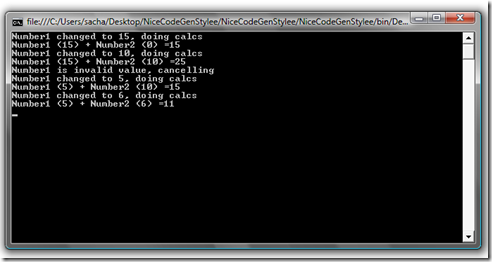At work we all try and do our best to be productive. And as software developers we all probably have to author classes, that follow a familiar pattern. So if like me you are looking to work smart, you will undoubtedly look into code that writes code.
This is good in my opinion, code generation can save a LOT of time. But the cardinal rule of clever code generation is never ever having to touch the generated code once it has been generated. If you do have to make changes by hand to a generated file, its all wrong and the entire process can no longer be trusted.
Now this perplexed me for a while as I had a very real demand to perform some calculations when a property changes. Now this would be cool and could possibly be made part of the generated code if you know about it in advance and have the correct knowledge to instruct your code generator about this in advance. We neither knew about these requirements up front or were able to build enough intelligence into our code generator to deal with this sort of this.
So you can imagine that our business analyst came along and said "when property X changes, use property Y and Z to work out Q". Mmmmm.
This would require me to do something when a property changes, this would mean manually changing my auto generated code. Oh no.
So I had a think about this, and luckily C# being the lovely language that it is has the answers. Partial classes / methods. All we need to do is provide the stubs in the generated code portion and provide hooks that the manually created partial class can use.
Here is an example.
The code generated part
1: using System;
2: using System.Collections.Generic;
3: using System.Linq;
4: using System.Text;
5:
6: namespace NiceCodeGenStylee
7: {
8: public partial class Class1
9: {
10:
11: private Int32 number1 = 0;
12: private Int32 number2 = 0;
13:
14: 15: 16: 17: 18: partial void Number1PropertyChanging(
IntReportChanges args);
19:
20: 21: 22: 23: 24: partial void Number1CodePropertyChanged(
Int32ItemChanges args);
25:
26:
27: 28: 29: 30: 31: partial void Number2PropertyChanging(
IntReportChanges args);
32:
33: 34: 35: 36: 37: partial void Number2CodePropertyChanged(
Int32ItemChanges args);
38:
39:
40: 41: 42: 43: public Int32 Number1
44: {
45: get { return number1; }
46: set
47: {
48:
49: if(value != number1)
50: {
51: Int32 oldValue = number1;
52:
53:
54: Int32ItemChanges possibleValueChanges
55: = new Int32ItemChanges(
oldValue, value);
56:
57:
58:
59: IntReportChanges changes =
60: new IntReportChanges
61: {
62: Values = possibleValueChanges
63: };
64: Number1PropertyChanging(changes);
65:
66:
67: if (!changes.Cancel)
68: {
69: number1 = value;
70:
71:
72: Number1CodePropertyChanged(
possibleValueChanges);
73: }
74: }
75:
76: }
77: }
78:
79: 80: 81: 82: public Int32 Number2
83: {
84: get { return number2; }
85: set
86: {
87:
88: if (value != number2)
89: {
90: Int32 oldValue = number2;
91:
92:
93: Int32ItemChanges possibleValueChanges
94: = new Int32ItemChanges(oldValue, value);
95:
96:
97:
98: IntReportChanges changes =
99: new IntReportChanges
100: {
101: Values = possibleValueChanges
102: };
103: Number1PropertyChanging(changes);
104:
105:
106: if (!changes.Cancel)
107: {
108: number2 = value;
109:
110:
111: Number1CodePropertyChanged(
possibleValueChanges);
112: }
113: }
114:
115: }
116: }
117:
118:
119: }
120: }
Where the manually created code part, can use these partial method stubs to do calculations when a property changes or even cancel a changing property based on some condition.
1: using System;
2: using System.Collections.Generic;
3: using System.Linq;
4: using System.Text;
5:
6: namespace NiceCodeGenStylee
7: {
8: partial class Class1
9: {
10: 11: 12: 13: 14: partial void Number2PropertyChanging(
IntReportChanges args)
15: {
16: if (args.Values.NewValue == 0)
17: {
18: Console.WriteLine(
19: "Number2 is invalid value, cancelling");
20: args.Cancel = true;
21: }
22: }
23:
24: 25: 26: 27: 28: partial void Number2CodePropertyChanged(
Int32ItemChanges args)
29: {
30: Console.WriteLine(String.Format(
31: "Number2 changed to {0}, doing calcs",
args.NewValue));
32: DoNumberCalcs();
33: }
34:
35:
36: 37: 38: 39: 40: partial void Number1PropertyChanging(
IntReportChanges args)
41: {
42: if (args.Values.NewValue == 0)
43: {
44: Console.WriteLine(
45: "Number1 is invalid value, cancelling");
46: args.Cancel = true;
47: }
48: }
49:
50: 51: 52: 53: 54: partial void Number1CodePropertyChanged(
Int32ItemChanges args)
55: {
56: Console.WriteLine(String.Format(
57: "Number1 changed to {0}, doing calcs",
args.NewValue));
58: DoNumberCalcs();
59: }
60:
61:
62: private void DoNumberCalcs()
63: {
64: Console.WriteLine(
65: String.Format("Number1 ({0}) + Number2 ({1}) ={2}",
66: number1, number2, number1 + number2));
67: }
68: }
69: }
Where these little helper classes are used
1: using System;
2: using System.Collections.Generic;
3: using System.Linq;
4: using System.Text;
5:
6: namespace NiceCodeGenStylee
7: {
8: struct Int32ItemChanges
9: {
10: public readonly Int32 OldValue;
11: public readonly Int32 NewValue;
12:
13: public Int32ItemChanges(
Int32 oldValue, Int32 newValue)
14: {
15: OldValue = oldValue;
16: NewValue = newValue;
17: }
18: }
19:
20: }
1: using System;
2: using System.Collections.Generic;
3: using System.Linq;
4: using System.Text;
5:
6: namespace NiceCodeGenStylee
7: {
8: class IntReportChanges
9: {
10: public Int32ItemChanges Values { get; set; }
11: public Boolean Cancel { get; set; }
12: }
13: }
And here is a demo of it running

See it all works lovely.
